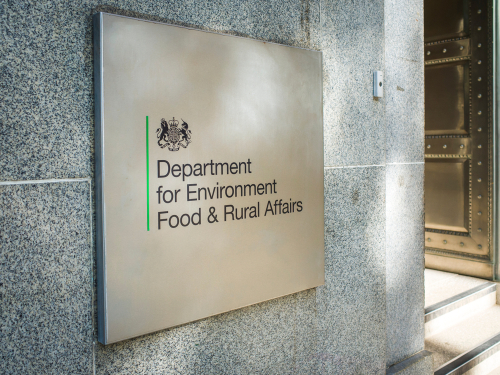Dr Clive Black: time for DEFRA’s disbandment
- Like
- Digg
- Del
- Tumblr
- VKontakte
- Buffer
- Love This
- Odnoklassniki
- Meneame
- Blogger
- Amazon
- Yahoo Mail
- Gmail
- AOL
- Newsvine
- HackerNews
- Evernote
- MySpace
- Mail.ru
- Viadeo
- Line
- Comments
- Yummly
- SMS
- Viber
- Telegram
- Subscribe
- Skype
- Facebook Messenger
- Kakao
- LiveJournal
- Yammer
- Edgar
- Fintel
- Mix
- Instapaper
- Copy Link
Posted: 7 April 2025 | Dr Clive Black | No comments yet
In this powerful opinion piece, Dr Clive Black, Vice Chairman of Shore Capital Markets, argues that DEFRA is no longer fit for purpose and must be dismantled.


Dr Clive Black argues for the disbandment of DEFRA due to its perceived incompetence, lack of responsibility, and chaotic handling of critical food and environmental issues, advocating for a structural overhaul of relevant governmental bodies. Credit: Shutterstock
A growing crisis in food governance
Esteemed Professor Chris Elliott, one of the world’s leading food science and safety authorities that the UK is blessed to have within its fold, recently warned in New Food Magazine of the growing biosecurity dangers and how underwhelmed he is, to put it politely, by the poor sense of ownership, responsibility, and so low prevention capabilities of the responsible Ministry, DEFRA.
It is not competence, it is the opposite… DEFRA is no longer fit and proper.
That farming and food leaders are approaching Government to express their concerns about the lackadaisical nature of the British State on such matters feels a bit upside down to me. Rather, it would surely be expected that the protectors of the nation’s wellbeing would be on the front foot, not being dragged out of their conservatories and lounges to protect the country.
Extended producer responsibility and wider failures
And then there is EPR, extended producer responsibility, now being comically introduced, which is where we see The Office meets The Thick of It in a smash reality government series of immense incompetence, the icing on the cake being that the £1.5-2.0 billion per annum to be raised from business to assist with more effective waste management actually goes straight to HMRC; the above reality TV series could have a sister in the Bank of England, The Office for Budget Responsibility (OBR), a contradiction in terms if there ever was, and The Treasury. There is a car crash of a process overseen here by senior DEFRA officials, often gong laden, who appear out of their depth, incapable, which supports the charge of incompetence.
As an aside, the arrogance of said officials is something to behold; I have seen it first-hand, taking the position of selective deafness, passive/aggressive behaviour, sulking plus cancelling any challenging opinion, for which the labyrinth of Civil Service process is sitting like a praying mantis to revel in, so wasting lots of public funds to prove the point that many officials are self-servicing not public serving, and the culture and outcomes for taxpayer and anyone else with the misfortune to have to need their assistance, is rotten.
From HFSS to DRS: a pattern of chaos
On top of EPR, one could add the handling of the introduction of HFSS into Great Britain, regulations around high fat, sugar and salt products in retailers that cost millions of pounds for elements of the trade to comply with only to be dropped like a stone and DEFRA just wash their hands and move onto the next car crash. And among many, that smash could be DRS, which was chaotic in Scotland albeit travelled a long way, with can kicking the sport of the week. Quite when and how EPR meets DRS, the Lord only knows, but no doubt the officials that are overseeing this chaos will be further elevated to cause chaos elsewhere in Whitehall by then, no doubt with more honours bestowed.
Time for structural change
All this is not acceptable. It is not a joke, it is reality. It is not competence, it is the opposite, and with the incapability of the human capital it is now time to think about a different way.
DEFRA is not a sponsoring Ministry for the largest industrial system in the UK, the food system, anything but, and with respect to the livestock sector it speaks with forked tongue; it would be happy for a structurally smaller industry with imports filling the void, such is the ideology of the place.
Many officials are self-servicing, not public serving — and the culture is rotten.
Furthermore, Reeves’ October 2024 Budget, among other things, has put an axe through any goodwill towards the Ministry from the British agriculture and horticulture sectors. As for promoting trade, the UK should have a body analogous to Ireland’s Bord Bia, which shows DEFRA up to be a cabal of total and utter amateurs.
A case for reallocation and leadership
In a different sphere, DEFRA is irrelevant and, frankly, compromised when it comes to the diet, health and wellbeing debates, which should, to me, sit within the Department of Health, where the Food Standards Agency should report into too. The abolition of NHS England is maybe a good omen here.
A new sponsoring home can also be found for the Environment Agency, alongside the form filling around farming subsidies, the latter could be an adjunct to the Business Department. There will be wrinkles that I concede are square pegs in round holes, but DEFRA is already such a body.
I have long argued for a Minister of the Food System to sit in Cabinet and with an appropriate secretariat, not the present DEFRA officials, to coordinate what is the ubiquity of food within the context of a dynamic and live national food strategy. Such a person becomes more relevant and necessary should common sense prevail and DEFRA form part of a necessary cull of a bloated, unproductive and too often rotten Whitehall.
The talent buried within
To be clear and fair, not that the folks that I challenge will accept these with anything but a shrug, there are hard-working, bright, responsible and talented civil servants in DEFRA. However, as with any failing organisation, they cannot shine. It was put to me by one NED of the Ministry that this positive talent base could be 20 percent of the DEFRA headcount, with half of the workforce turning up and going home doing their jobs, but one-third being anything from ideological to taking whatever inappropriate word one wishes for their own and others’ agendas, but not that of the State and certainly not the British food system. Such a description feels plausible, underscoring, again, the need to scrap DEFRA.
A final reckoning
No doubt DEFRA will say such comments are bullying, unreasonable, cheap shots and so forth, which has been put to me by a senior official, but that is to also underline the rotten, arrogant and detached culture of a place that is no longer fit and proper. It is time for DEFRA’s disbandment.
About the author


Related topics
Related organisations
Department for Environment and Food and Rural and Affairs (DEFRA), Shore Capital









